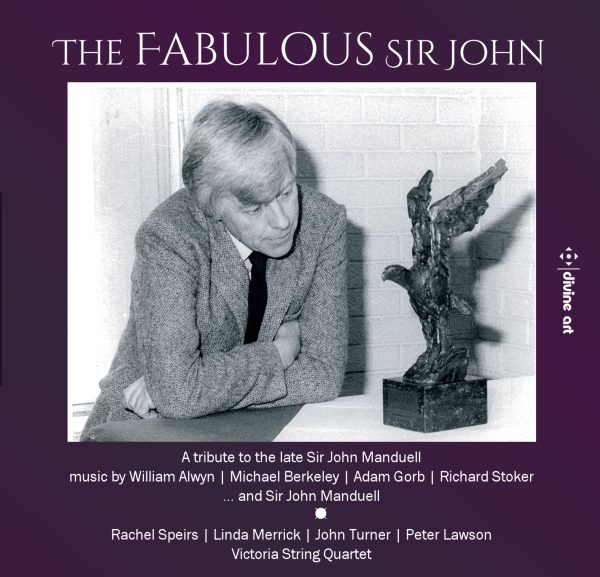Infodad
The talents of Sir John Manduell (1928-2017) included composition but went considerably beyond his creation of music: Manduell was a well-known producer, teacher, and artistic director in Great Britain. However, he is virtually unknown in the United States in any of his roles, in all of which he functioned in the United Kingdom; and while he is famed within the music profession in Europe, he is not exactly a household name outside the music field, even on that side of the pond. So a CD devoted to tributes to Manduell is by definition a limited-interest item – and two CDs of tributes would seem to be over-the-top. But that is what Divine Art is offering: The Fabulous Sir John is an add-on to a previous tribute disc called Songs for Sir John.
In some ways, the new disc is actually a better tribute than the earlier one: the previous disc included works by 16 contemporary composers, while the new one offers works by only five – but one of them is Manduell himself, so this disc is a way for the uninitiated to hear some music written by the person who is being lauded. Nor is it a small amount of music: nearly 40 minutes of the CD’s 65 are devoted to works by Manduell, and an additional piece, the four-minute Aria for Sir John by Adam Gorb (born 1958), sets the scene for the pieces by Manduell himself. Gorb’s piece is fine – sensitive without being overly mournful – but Manduell’s own are something of a mixed bag. Elegy has some sensibilities in common with Gorb’s work; Recitative and Aria, although not a vocal work, has the right approach to justify its title, although its insistent dissonance is a bit much; Trois Chansons de la Renaissance offers three pieces that are vocal (sung by soprano Rachel Speirs), and here the settings are first-rate, keeping the words clear while providing very apt piano support (Peter Lawson is the pianist); Bell Birds from Nelson is rather obvious, if pleasant, in its use of recorder (played by John Turner); Nocturne and Scherzo, the longest Manduell work offered here, contrasts its sections suitably if not especially surprisingly; and Tom’s Twinkle is a nice little 90-second bit of fluff with, again, a recorder focus.
After the Manduell-composed pieces on this disc, there is A Dark Waltz by Michael Berkeley (born 1948) – the piece is more crepuscular than genuinely dark-hued. Then Speirs returns, this time accompanied by the Victoria String Quartet, for 5 Songs from “Songs of Innocence” by William Alwyn (1905-1985). The words by William Blake have attracted many composers, and Alwyn’s settings are fine, although some of the vocal lines are rather overdone for poems that Blake intended to be un-ironic presentations of naïve feelings (in contrast to his Songs of Experience). The disc concludes with Memento Mary Magdalene by Richard Stoker (1938-2021), which uses recorder and string quartet to produce a quiet and thoughtful ending for this tribute disc. All the performers – also including Linda Merrick (clarinet), Benedict Holland (violin), Kim Becker (viola), and Jennifer Langridge (cello) – perform with sensitivity and a sense of suitable deference to the person whose accomplishments the CD is designed to celebrate. But none of the music, including that by Manduell himself, is so noteworthy as to command attention beyond that associated with this particular memorial project. As well-intentioned as this second Manduell tribute disc is, it remains, like the first one, an offering strictly aimed at people familiar with and appreciative of Manduell, especially ones for whom his many significant musical roles were important during his lifetime.
@divineartrecordingsgroup
A First Inversion Company
Registered Office:
176-178 Pontefract Road, Cudworth, Barnsley S72 8BE
+44 1226 596703
Fort Worth, TX 76110
+1.682.233.4978





![🎧 Listen now to the @purcellsingers' first single from their upcoming album, #ASpotlessRose! ➡️ listn.fm/aspotlessrose [in bio]](https://scontent-dfw5-2.cdninstagram.com/v/t51.71878-15/642752592_1424641949105789_8815810652567824072_n.jpg?stp=dst-jpg_e35_tt6&_nc_cat=106&ccb=7-5&_nc_sid=18de74&efg=eyJlZmdfdGFnIjoiQ0xJUFMuYmVzdF9pbWFnZV91cmxnZW4uQzMifQ%3D%3D&_nc_ohc=aY1NGfNpOoYQ7kNvwHV9imY&_nc_oc=AdnSO2fGnOha7jIZYRbM43KlfL8dyNT-Gs1dhJvNEf5K_fTa9us4Crr-3Qe-8QjaZ0Q&_nc_zt=23&_nc_ht=scontent-dfw5-2.cdninstagram.com&edm=ANo9K5cEAAAA&_nc_gid=MTvVqr0KQ8hJ_BrHkjqsFA&_nc_tpa=Q5bMBQEjXZBevgXOBk_cOUKVDwj7TmLSdtda9iFcDowsg1IsWgoE8DfWbT0F9vwN8PtaM7x8-JaR-mi6DA&oh=00_Afwzq_V58ehc8Nc9LwBT8qOC8uNl3lYquQ_bAJPhpdk1pg&oe=69AE9C41)






